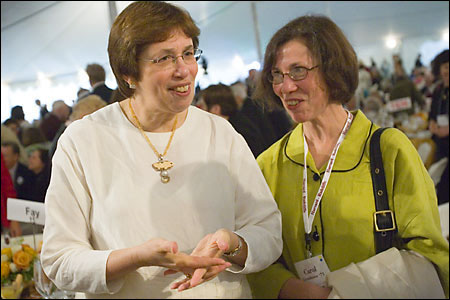Greenhouse sings the blues
Radcliffe medalist decries lack of activism
One might have expected Linda Greenhouse ’68, the Pulitzer Prize-winning U.S. Supreme Court correspondent for The New York Times and recipient of the 2006 Radcliffe Institute Medal, to devote her keynote address at the annual Radcliffe luncheon June 9 to an analysis of recent court decisions or predictions about the court’s future course under its new Chief Justice John Roberts.
Certainly Greenhouse, who has covered the court since 1978 and is renowned for her ability to report not only on what the justices say but on what their decisions mean in a larger context, could have provided such insight. But she chose not to. Instead, she framed her talk with lyrics from Simon and Garfunkel.
Greenhouse related how she went to a concert in Washington, D.C., a few years ago at which the two singer/songwriters reunited to reprise their repertoire of hits going back to the early 1960s. Surrounded by “aging baby boomers” like herself, she found herself beginning to cry when the duo sang the song “America” with its verse, “Counting the cars on the New Jersey Turnpike / They’ve all come to look for America.”

The reason, she said, was the realization that her generation, which had been “absolutely united” in its belief that it would do a better job of running the country than its predecessors had done, was failing to live up to that promise.
Reports of torture of prisoners and massacres of civilians in Iraq and assaults on reproductive freedom at home made it clear to Greenhouse that the once-idealistic baby boomers were not handling power any more fairly or virtuously than those who had failed to prevent the ethical disasters of earlier times.
“But before we all run out and throw ourselves into the Charles,” Greenhouse added, perhaps it would be instructive to consider what has been accomplished.
When Greenhouse graduated from Harvard in 1968, she said, the Boston Globe would not give her an interview for a reporting job, even though she had written extensively for the Harvard Crimson and had contributed stories to the Globe as a student stringer. But today, the many women who hold important editorial positions on major newspapers show how far female journalists have come since that time.
“I don’t mean to suggest that nirvana has arrived,” Greenhouse said. “After all, Harvard still has not had a female president. But it’s impossible to look at recent decades and not feel some optimism.”
Gains made by gays and lesbians are another source of hope that America is becoming a more tolerant society, Greenhouse said. In 1993, when Colin Powell, then chairman of the Joint Chiefs of Staff, served as Harvard’s Commencement speaker, many gays and lesbians boycotted the proceedings because of the armed forces’ “don’t ask, don’t tell” policy.
Greenhouse said that when Powell arrived on campus, a gay Harvard alumnus greeted the general and said he “looked forward to the time when this issue no longer divides us.”
In response, Greenhouse said, “Powell embraced him and said, ‘I hope that day comes sooner than later.’”
Greenhouse contrasted this exchange with the so-called “good old days,” when “I wasn’t even aware of anyone who was gay” and when the issue of gay rights was not even publicly acknowledged.
Greenhouse said that such examples of progress in civil rights and equal opportunity for minorities have made her realize that while the baby boomers may have made some of the same errors committed by previous generations, there have been signs of positive change.
“In my lifetime, I have seen fences around distinctions lowered, making us more able to reach across the barriers that divide us,” she said.
She ended her talk by quoting from another Simon and Garfunkel song, one that conveys a message of hope for the future, “Bridge over Troubled Water.”
Share this article
All your dreams are on their way See how they shine If you need a friend I’m sailing right behind Like a bridge over troubled water I will ease your mind




